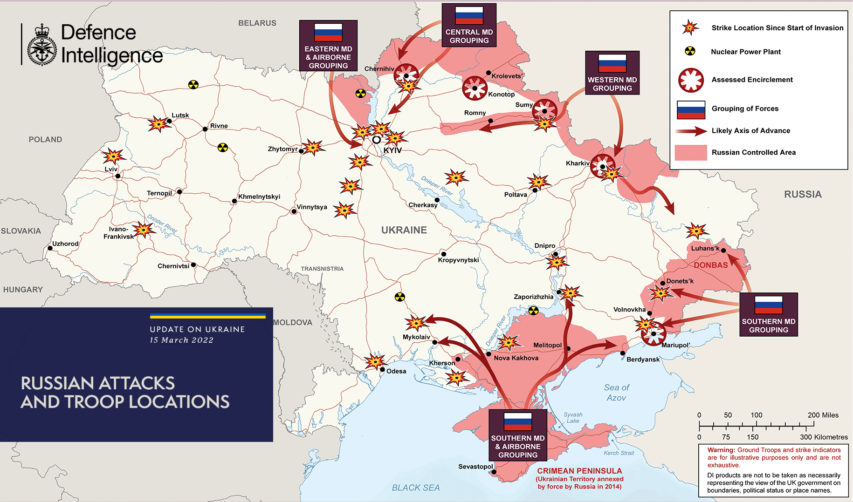As you’ve probably noticed, I don’t post a lot of information about the progress of the Russian attack into Ukraine, not because it isn’t an incredibly dangerous and volatile situation but because the signal-to-noise ratio of available public source intelligence is lower than I ever expected (and I didn’t have high expectations to start with). My sympathies are largely with the Ukrainian civilians who have been caught up in a maelstrom of violence and my appreciation of abilities and achievements of the individual Ukrainian defenders has increased a great deal as this conflict continues. What Russian planners (and Putin himself) clearly expected to be a “short, victorious war” is turning out to be a much more difficult, much more costly struggle. Western politicians and diplomats have not covered themselves with glory and the western media have been shown to be inadequate to the task of providing anything like objective coverage of the war. American politicians grandstanding about imposing a “no fly zone” over Ukraine really need to be chased down by the white-coated orderlies with nets and gently brought back into the mental health facilities they clearly just escaped from: a no-fly zone is tantamount to a declaration of war, and a war between Russia and the US/NATO would very quickly go full-on nuclear. The only winners so far have been the official and volunteer propagandists for the Ukrainian government, who have overwhelmed the mainstream media and social media with their very persuasive tales and mediagenic stories.
Of course, it doesn’t help that Ukraine largely uses Russian-made equipment, so photos and videos of damaged tanks, smoking remnants of trucks and armoured personnel carriers, and other telegenic “news” can be presented as either side’s defeat in this or that skirmish. Kurt Schlichter wonders if we can have some “real talk” about Ukraine:
Time to get real. Ukraine is an equal opportunity crisis because it provides politicians of both parties a chance to be wrong, although it allows the Democrats the opportunity to do what they do best and be much, much more wrong. For the Republicans, it lets them indulge the desire of some to return to a time when America could focus its moral firepower – if not its firepower firepower – upon a readily-identifiable baddie like it did during the Cold War or the War on Terror. For the left, it allows them to create a moral panic to replace COVID, which, naturally, requires that we Americans “sacrifice” even more of our freedom and money.
From the perspective of someone who actually trained Ukrainian troops in Ukraine, commanded US forces, and attended the US Army War College – though it’s kind of the Chico State of war colleges – the whole way our elite is approaching the crisis is an epic clusterfark. Don’t believe anything anyone tells you – and certainly, sanity check whatever I’m telling you, too – most of these insta-experts on intra-Slavic conflict know absolutely squat-ski. Moreover, their remarkably dumb observations and credulous acceptance of conventional wisdom, which has proven long on conventional and short on wisdom, are being presented without any kind of strategic context. They don’t know where this crisis came from and certainly have no clear notion of where they want it to go beyond the vague and unhelpful idea that they want Putin (which they use interchangeably with Russia) to “lose” without knowing what that even means.
[…]
The expectation was that the Russian forces would smash through, surround the Ukrainian forces pinned down facing the Russians in the occupied regions to the east, and isolate the main cities. I did not expect them to go into the cities immediately since Russians 1) generally bypass hard defenses; 2) they have bad experiences with city fighting (Stalingrad, Grozny); and 3) that would not necessarily be necessary. It would not be necessary if the idea was to neutralize the main Ukrainian combat formations and force the government in the cities to capitulate, then have the West pressure the Ukrainians to accept a ceasefire and “peace” that recognized Russian gains and ended the idea of Ukrainian allying with the West. In fact, that is pretty much what the Russian “peace plan” consists of. But that did not work for a couple of reasons.
First, the Russians did not fight as well as expected. You should always treat the enemy as if it is the best possible enemy. We did in the Gulf. We prepared to fight elite Republican Guard divisions of highly trained and motivated soldiers using top-shelf Soviet equipment and tactics. None of that was so; we crushed an entire national army in 100 hours.
The Russians are poorly-led, with very weak synchronization among maneuver forces and fires. Their plan is okay – in fact, you look at a map, and it’s obvious what they would do. But their gear is badly-maintained, and their troops are unsuited to the task of supporting a rapid advance. Look at all the evidently intact gear simply abandoned by the side of the road. Lots of it looks like it broke down (note all the flat tires). Much of it seems to have run out of gas. And, of course, lots of stuff had been blasted apart.
That’s the second part of the equation – the Ukrainians fought back hard. If you are a Lord of the Rings nerd, think of the Ukrainians as the dwarves. Not super-sophisticated but tough and ready to fight, and also often drunk.




